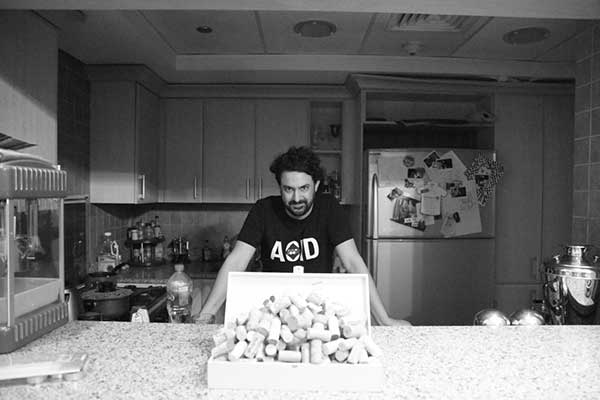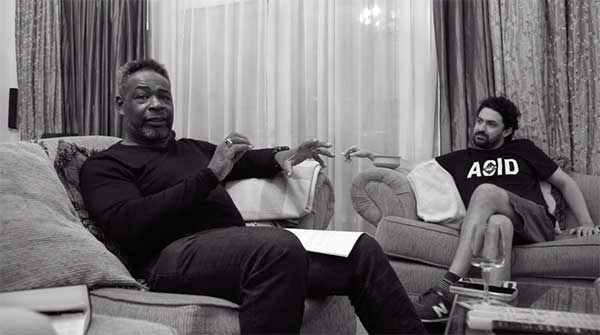| Are you playing, or being played? | |
| Fibre Passion 12th April 2017 Link |
|
 Fibre talks with ‘A Guy Called Gerald’ & ‘Siamak Amidi’ about Gentrification and its effects on the music scene. Are we so inclined to renew and brand anew almost everything around us? Are we always seeking for change regardless of the costs? Our favourite places are no longer our favourite, the people we thought we knew no longer do we know them. A particular quirk is at first an attraction, until it surfaces in full light and becomes a banal normality, and it is only then do we decide to change it, or leave it. Our environment is constantly evolving and devolving, some might say, in both a natural and unnatural manner, within and without our control. But one thing that hardly ever changes is a person’s true solace. For some it is their life long lover, their family, a morning cigarette, literati in blue and green or music. No matter the subject, it can give a sense of constancy depending on the circumstances. It can cushion, reveal, unravel, emancipate and make you face yourself. In our day-to-day, light-years beneath the black surface of twinkling lights, reign our metallic towers, the mayhem of shuttles and machines, as if in a sci-fi fiction, we are the monsters looking up. We forget to blend in with our natural surroundings, to immerse ourselves in all that is hand-crafted, to be lovers and artists of whatever kind. Then there are the few, dabbling in and out of the iron buildings and daytime lunacy forever trying to grab the stars, when everything around them is being stolen and lost. These few feel the urge to escape to the top or under the ground, because being in the middle is like being in purgatory, forever waiting on an answer, for the next step. The foggy taste of the holidays is in the air, it is five days away from Christmas and we are seated in the home of Siamak Amidi, waiting on a Guy, Called Gerald. A cat named Porto is minding his own business enwrapped in his own cravings. The door opens to Gerald and he greets us in his full robustness. From the onset we can suss out that it will take a while to get him to warm up, but his intelligence is part of his aura. We were interested to know his take on Dubai, even though he is a regular visitor and show stealer at Analog Room. He extended his stay after his gig, which probably meant he was having a good time in this city, or was possibly avoiding something else. Then we discovered that regardless, “he feels at home so long as he is playing music.” And on being in London, his supposed home, he says, “I feel that my nose is being pushed out of my own home country.” Our conversation ensues with a discussion on his metropolitan city and where he lives and hangs out, and how the East part of the city has changed. We talked about Brixton in particular, and how it was once the area you would only dare to roll into if you weren’t from those ends, and how now it has become the equivalent to the gentrified Brooklyn of NYC. Having spent some time in NYC circa 1999, he shares that,
“Artists aren’t a threat to a ‘hood’ area or community.”  A DJ, music guru, traveller and intelligent individual, Gerald shares his takes and observations on how the cities that he often travels to are changing, how the crowds and artists are reacting to the power of the corporate and the elite. There is a certain stigma that comes with nightlife, particularly with venues and artists that play certain genres and types of music. Quite simply, take Hip-hop and rap for example which is forever affiliated with violence, and then there’s Techno and its affiliation with drugs. These are mere examples of how these genres of music are perceived and the masses end up steering clear from areas where these scenes are strong. It is true that on many occasions, in many instances, over the decades, these genres of music have lived up to their stereotypes, with people being stabbed on a Hip-Hop night out, or overdosing on a Techno night-out, resulting in the shutting down of many of these venues overnight. However, it is a vicious cycle when an artist’s attempt to create and bring to light a sense of culture, is abused and used incorrectly. It is the artist as well as his or her followers that pay the price. But the irony is that the more artists infiltrate a particular area within a city over time, the ‘safer’ it becomes which in fact counteracts the initial rejection of a space, eventually appealing to wider parts of communities elsewhere. It becomes a calling for investors when they see and taste a cultural phenomenon on the rise. It is the industrial areas of big music cities such as Berlin and New York City that undergo these changes of gentrification, even though you would think no one would be interested in them. Yet what is happening is that they are being taken over by the masses, and their ‘underground’ music venues are being shut down and converted for other uses. Slowly, boutique cafés pop up, high-end stores come to life and the once raw part of the city becomes a kitsch replica of Manhattan. Prices rise and the ‘poor’ artists are driven out of their hub. It is indeed a vicious cycle of artists creating a space and it turning into a cultural, high-end investment, when most “true artists just want to be incognito.” The affect on the music scene is still not totally known, but the evidence is racking up with some of the greatest and most loved places closing up shop. Siamak asks though, “how are artists going to absorb these changes?” A question still too early and broad to answer. The approach of the city in question is very important in the sustenance or digression of its music scene. Take Berlin for example, one of the greatest providers of ‘underground’ music and urban venues, now also a target of gentrification. It bears a seamless attraction for artists from all over the world, which in turn makes us question, is this phenomenon also attracting investors to plot family friendly malls next to the renowned clubs? The changes in an urban landscape have a heavy consequence on the crowd and artists alike. The crowds in question may be driven to follow the mainstream scene, abandoning the true sounds of true artists, and the artist can be led into losing integrity in order to just make sales and a name for themself. When you analyse the Hip-Hop/Rap music industry today, it is entirely driven by the idea of ‘sex sells’ manipulating artists to feed further the numbness of a lot of so-called Hip-Hop music today. When in fact, for Siamak for example, “Music is really about artistic invention, integrity and telling a story.” We cannot help but observe that this may be all in all a result of the system we are trapped in. A grand system of order, progression, capitalism and so on. When man is driven by his or her personal goals to success and achievement, what is the consequence that we are faced with? In the short term it is the loss of valuable moments that stir our souls, and in the long term it could be a total selling out and a reshaping of the arts in all spheres. It goes without saying that this vicious cycle of creating, sharing and succeeding has detrimental consequences where we can forget to touch base and can not recall our initial motivation, which is to do something different and honest. And so our true solace remains private and personal, untouched by others, forever radiating within the minorities. Are we being told or sold a story nowadays? These are some of the consequences of gentrification, its reference to the ‘renewing’ of a landscape and somewhat discreetly and overtly, the manipulating of artists, the music scene, and the disintegration of the ‘underground’ scene. In the end, more often than not, we find ourselves squeezing into tightly packed spaces that try to pay homage to the true sounds of true artists. Perhaps that is why we are so programmed to question, “why do all good things come to an end?” The question in itself hints at an awareness and anticipation that nothing lasts forever. And so we make do, we try to touch as if with a magic wand the faces and places around us, to feed our thirst, in our lifelong search and desire for the gentrification of our souls.  [Writer / Editor: Shams Albadri, Photographer / Editor in Chief: Walid Nehme] |
|